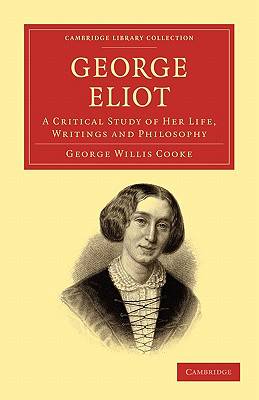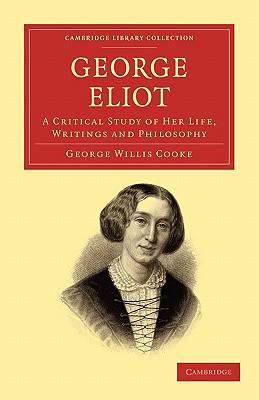
- Afhalen na 1 uur in een winkel met voorraad
- Gratis thuislevering in België vanaf € 30
- Ruim aanbod met 7 miljoen producten
- Afhalen na 1 uur in een winkel met voorraad
- Gratis thuislevering in België vanaf € 30
- Ruim aanbod met 7 miljoen producten
Zoeken
€ 90,45
+ 180 punten
Uitvoering
Omschrijving
American Unitarian minister George Willis Cooke (1848-1923) worked for almost thirty years in Unitarian churches across the United States before turning full-time to scholarly pursuits in 1900. Cooke, a voracious reader who was largely self-taught, attended Meadville Theological School in Illinois but never graduated. A radical in theology and politics, he was drawn to the transcendentalist authors and in 1881 published a critical study of the works of Ralph Waldo Emerson. Cooke's George Eliot: A Critical Study of her Life, Writings and Philosophy (1883) probably emerged from those same philosophical impulses. The book was published just after Blind's biography, but Cooke asserts that with a small exception his work was complete when hers appeared; moreover, his study prioritises the act of 'interpreting and criticising [Eliot's] teachings' over the details of her life, and the book's organisation reflects this hierarchy, giving insights into the contemporary reception of George Eliot.
Specificaties
Betrokkenen
- Auteur(s):
- Uitgeverij:
Inhoud
- Aantal bladzijden:
- 450
- Taal:
- Engels
- Reeks:
Eigenschappen
- Productcode (EAN):
- 9781108019613
- Verschijningsdatum:
- 16/09/2010
- Uitvoering:
- Paperback
- Formaat:
- Trade paperback (VS)
- Afmetingen:
- 140 mm x 216 mm
- Gewicht:
- 566 g

Alleen bij Standaard Boekhandel
+ 180 punten op je klantenkaart van Standaard Boekhandel
Beoordelingen
We publiceren alleen reviews die voldoen aan de voorwaarden voor reviews. Bekijk onze voorwaarden voor reviews.











